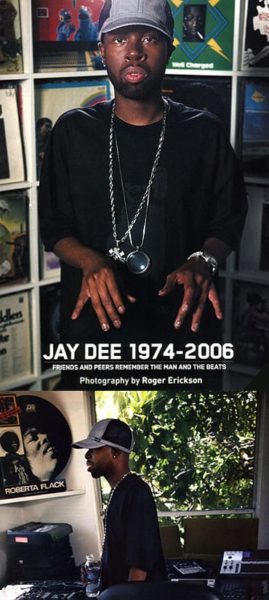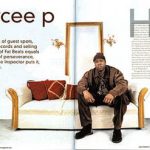J DILLA, YOUR FAVORITE PRODUCER’S FAVORITE PRODUCER, MAY HAVE PASSED ON, BUT HIS MUSICAL LEGACY WILL NEVER FADE AWAY
Some do it for the fame, and some do it for the dough, but there are fewer and fewer doing it for the love. James “Jay Dee” Yancey, or Dilla, was a man truly in love with the music. When he died on the morning of February 10, 2006, the world didn’t just lose the quiet musical genius known for his work with De La Soul, Common, A Tribe Called Quest, Slum Village, Busta Rhymes and the Pharcyde: his death was more than just the passing of a producer the likes of which music rarely sees. Like Lee Scratch Perry was to dub, Sly Stone was to funk, and John Coltrane was to jazz, J Dilla wasn’t just a musician: he was a scientist.
The music stopped that day when Jay Dee died in the arms of his mother, Maureen Yancey, in his Los Angeles home. To her, he was James-her shy and compassionate son, her best friend, her pride and joy. To friends and fans the world over he was Jay Dee producer, prodigious instrumentalist, MC and god among musicians. This was the man who helped define the modern sound of his city, Detroit, who influenced everyone from The Neptunes’ Pharrell to Kanye West to D’Angelo, and crafted classic tracks like Common’s “The Light,” De La Soul’s “Stakes is High” and A Tribe Called Quest’s “Find a Way.” He was your favorite producer’s favorite producer, the crate-digger with the golden ear. In an oft-mentioned anecdote. Pharrell appeared on BET’s 106 & Park in 2004 and, when asked who his favorite producer was, he said, “Jay Dee.” (And no, he didn’t mean Jermaine Dupri.) Pharrell quipped that the crowd had probably never heard of him.
Kanye says he was influenced as well. “He inspired me so much. One of the best days of my life was when he handed me a record with drums on it. I was so honored.” In an interview with BBC radio, West explained that he has jacked drum sounds from Dilla’s beat CDs in the past and that he, like so many other beatsmiths, revered the man.
But Pharell was probably right: Unless you’re a beathead, or one of those obsessive Hip-Hop junkies who reads the credits while listening to albums, his name may not be familiar to you. Though he rhymed with Slum Village, the Detroit trio he co-founded, and on solo efforts, too, Jay wasn’t the type to put himself in the foreground. Contrary to his on-record persona. he was the cat constantly in the cut. Unlike so many super-producers these days, he didn’t frequent industry parties or fiend to make cameos in videos. But he wasn’t on some earthy, granola, anti-bling shit, either. (His favorite ride was his Cadillac truck, which he renamed the “Dillalade.”) But as a sound provider, he was comfortable playing the back most of the time. Like his idol, Pete Rock, he let his music speak for him.
J Dilla was a true product of Motown. His father, Beverly Yancey, worked for the Ford Motor Company for 40 years and was a friend of Motown Records founder Berry Gordy. Jay’s dad was also a vocal coach who played upright bass, and his mother Maureen sang in various styles. including jazz, opera and gospel. Jay’s parents were strict. They kept their son out of trouble and off the streets by encouraging his pursuit of all things music-related, from church choir to school marching band to his first love-records.
Mrs. Yancey recalls how a 2-year-old James would walk with his father to the park with “all the 45s his little arms could hold,” intent on playing them on a record player. He wasn’t really into toys. Little Jay Dee was a DJ. Creative expression ran in the family and music seemed to flow through his veins. But ultimately, it was his blood flow that would bring about his untimely death.
In 2002, Jay Dee was diagnosed with a rare blood disorder known as thrombotic thrombocytopenic purpura (TTP), which decreased his platelet count drastically and restricted blood flow to his kidneys and heart, leaving him weak. But weakness was unfamiliar territory to Jay Dee. He had never been weak-spirited, he didn’t make weak beats, he didn’t kick weak raps and he damn sure wasn’t going to let his illness prevent him from doing what he loved.
During an extended hospital stay last summer, Dilla’s friends from the L.A.-based indie label Stones Throw came to his aid. “They brought him a little Boss [SP] 303 sampler and little 45 record player,” says his close friend and fellow producer Karriem Riggins. “That’s what brought him through to make a lot of music that we hear on Donuts.”
In fact, Dilla completed 29 of the 31 songs on the aforementioned Donuts instrumental LP, his latest masterful release, while still in the hospital. The album was released through Stones Throw on Dilla’s 32nd birthday-only three days before he passed away.
SOUL SONIC FORCE
What was Dilla’s contribution to Hip-Hop production? Ask a musicologist like The Roots’ bandleader ?uestlove and you’ll get an earful. “If you hear any song [with] a glitch in the [drum] pattern? That was Dilla,” he explains. “If you hear bouncy, filtered bass patterns? Dilla. Offbeat snaps, offbeat claps? Dilla.” Jay Dee’s gift for rearranging sounds and creating soundscapes that ranged from layered and lush (Common’s “Thelonious”) to sparse and frenetic (Q-Tip’s “Breathe and Stop”) is the stuff of legend. Not the type to simply sample the first two bars of a song as soon as the needle dropped, Dilla would listen to the whole record before looting it. And even then, he didn’t just sample-he flipped. He took the blue-eyed soul of Bobby Caidwell’s “Open Your Eyes” and transformed it into a masterpiece of scratched-in vocals, luminescent keys and speaker-shaking bass for Common’s “The Light.”
When asked what made Dilla more of a musician than the average cat with equipment and old records, ?uest says, “Dedication. While we out flossin’, while we tryna holla at the jawn at the club, while we living the good life, this mofo is making music.”
“He was my right hand, left hand, my friend, my brother,” said a mournful Q-Tip in a statement released the following morning after Dilla’s untimely passing. “Although he is gone, he is still chopping the beat, finding the loop, dusting off the MPC and helping me out-but from another place.”
J Dilla’s body of work is vast; people in his camp estimate that he has unreleased beats and songs numbering in the tens of thousands. His mom has made it her life’s mission to see that all of them get released, and has started Ma Dukes Music to see that her goal is accomplished. “Chances are he will have made more music than all of us put together,” ?uest says, “and we are still alive on earth with the ability to make music.”
Prolific, profound and professional, Jay Dee was in a class by himself and will undoubtedly be rediscovered by generations to come. “I told Tip,” says Common. “I said, ‘This made me feel like we really just witnessed the John Coltrane of our time.” If that’s true, then music was indeed Dilla’s love supreme.

